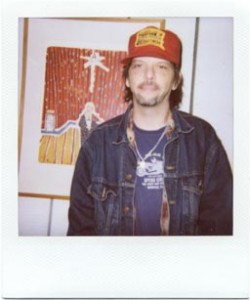During the summer of 2001, I interviewed one of my favorite musicians, Mark Linkous of Sparklehorse–or rather, Mark Linkous who was Sparklehorse, a one-man-band indie tour de force. A friend passed along Good Morning Spider, one of the most haunting albums I have heard to date, filled with Gothic overdubs and surreal lyrics that recall the phantasmagoric world of Flannery O’Connor and Breece D’J Pancake (poisonous frogs, smoking bees), and when I heard Mark had a new album on the horizon, I called Mark’s PR people and begged for an interview. “That’s funny,” I was told, “no one asks to interview Mark. Why not?”
One bright summer day, I had plans to meet Mark at a bar in Williamsburg. On the phone Mark had been genial and self-effacing. “I don’t care where we go,” he said in his Virginian drawl, “as long as there’s liquor.” His longtime collaborator and Sparklehorse drummer Scott Minor, with whom he was staying (didn’t rock stars have crash pads everywhere? I remember thinking), dropped him off in a rusted, muffler-dragging pickup truck straight out of Deer Hunter. In 1996, while touring in support of Radiohead in London, Mark overdosed on a mixture of alcohol, valium, and anti-depressants. Found more than fourteen hours later collapsed on a hotel floor, Mark’s legs were pinned under him and the potassium buildup in his blood left him temporarily paralyzed from the torso down. Mark wrote much of Spider while recovering at London’s St. Mary’s Hospital (the hospital of royalty, incidentally), and he spent the next sixth months recording the album confined to a wheelchair.
When we met, Mark, a tall, lanky question mark of a man, was wearing baggy jeans which concealed the leg supports he still had to wear, more than a decade after the incident. Mark was wearing a red trucker cap and jean jacket.
Pete’s Candy Store, the bar we met in front of, wasn’t going to be open for a few hours, so we walked around Williamsburg together, stopping by a flea market, where I tried to talk Mark into buying an old Speak-and-Spell. “I already got enough of those,” he said, “but you go right ahead.” Our next stop was Main Drag Music, which used to be on Bedford. Mark was a shy, introverted man, who clearly relished being able to walk around without being noticed, despite the fact that many of us consider him as legendary and important a force in music as his friend Vic Chestnutt or even Thom Yorke. As soon as we walked into Other Music, it was clear that everyone knew who Mark was, but his celebrity isn’t the kind you make a show of, I guess, and the clerks limited their admiration to a few grunted “Hey, man”s, which Mark enthusiastically returned. He was a Southern Gentleman to the core.
We finally settled on a converted car-repair shop which had recently reopened as a hipster bar. The chairs were velveteen and moth-eaten. Mark’s drink of choice was whiskey with milk, the original white Russian. He rolled his own cigarettes with one hand. Twenty minutes into our conversation, I realized the microphone had conked out on us. Considering Mark’s considerable history of voice alteration, this seemed like an appropriate, if unfortunate, turn of events. “Don’t worry about them things, anyway,” Mark said. “Everything you need to know, you’ll remember or it ain’t worth remembering. Actually, I don’t believe that myself, but I can’t ever seem to get them fuckers to work either.”
Madly scribbling Mark’s musings on a series of napkins, I tried to salvage the interview, but the next two hours were spent in friendly banter, as if I’d known Mark all along. In a way, of course, I did–he had the put-you-at-ease familiarity as a farmer.
What I remember Mark said follows. I’m sorry I wasn’t able to figure the recorder out. I’d love to be able to listen to Mark’s voice again.
“There’s no reason bands like the Flaming Lips or Grandaddy can’t be as popular here as in Europe. It’s the state of radio. It’s because the state of the industry here is so abysmal, but it’s also because Americans aren’t as open as they used to be.”
“I’m still just faking it. Sometimes I tape the keys of my keyboard so I know what to push and when.”
“It’s haunted,” Mark said, speaking of his music. “But only the women in my life have seen him. He’s this old guy who just sits at the kitchen table, waiting to be fed.”
When asked why he alters his voice so much, Mark said, “I hate my voice.”
“I’m sick of everyone saying, ‘You’re lyrics are so dark, you must be really depressed.’”
“If I can’t have a gold day, the least I can do is create something that’s going to—even if it puts a miniscule fraction of beauty in the world, that’s all I want to do.”
“I’d just like to hang out with farmers instead of musicians, anyway.”
You can be my friend
You can be my dog
You can be my life
You can be my fog
Mark Linkous, RIP


